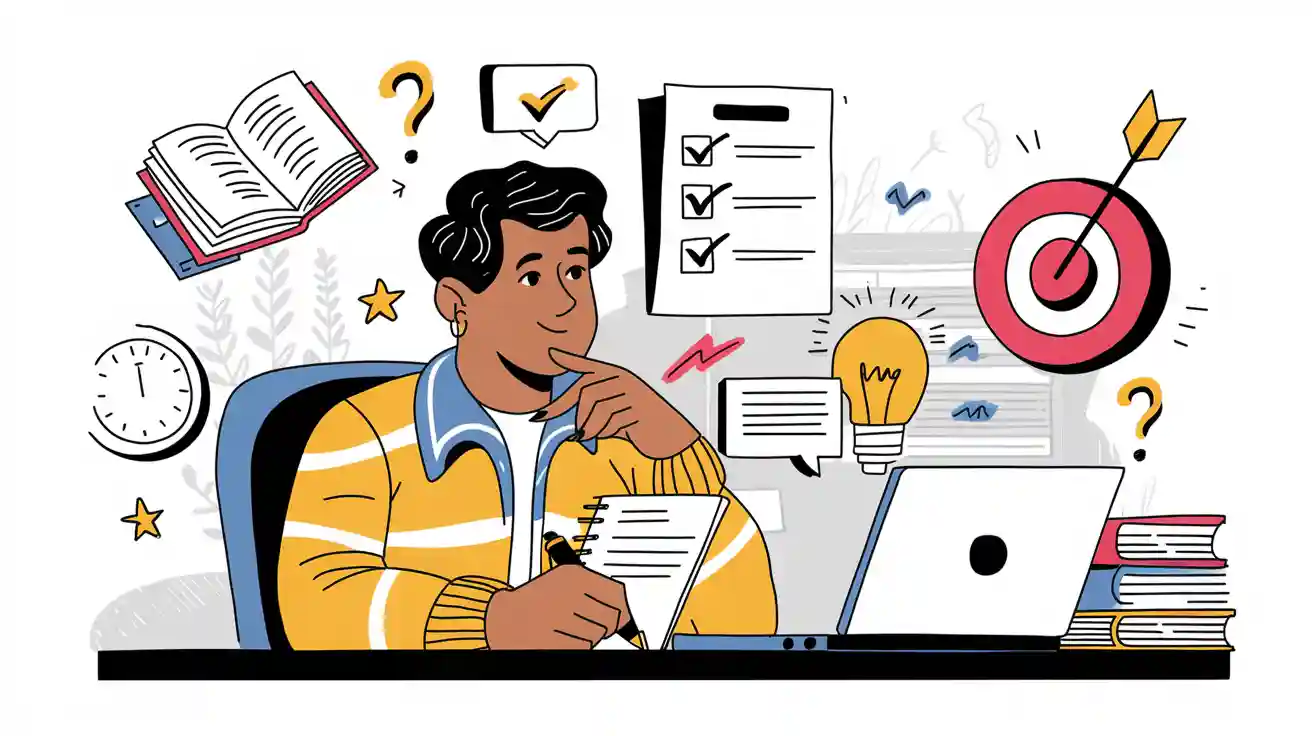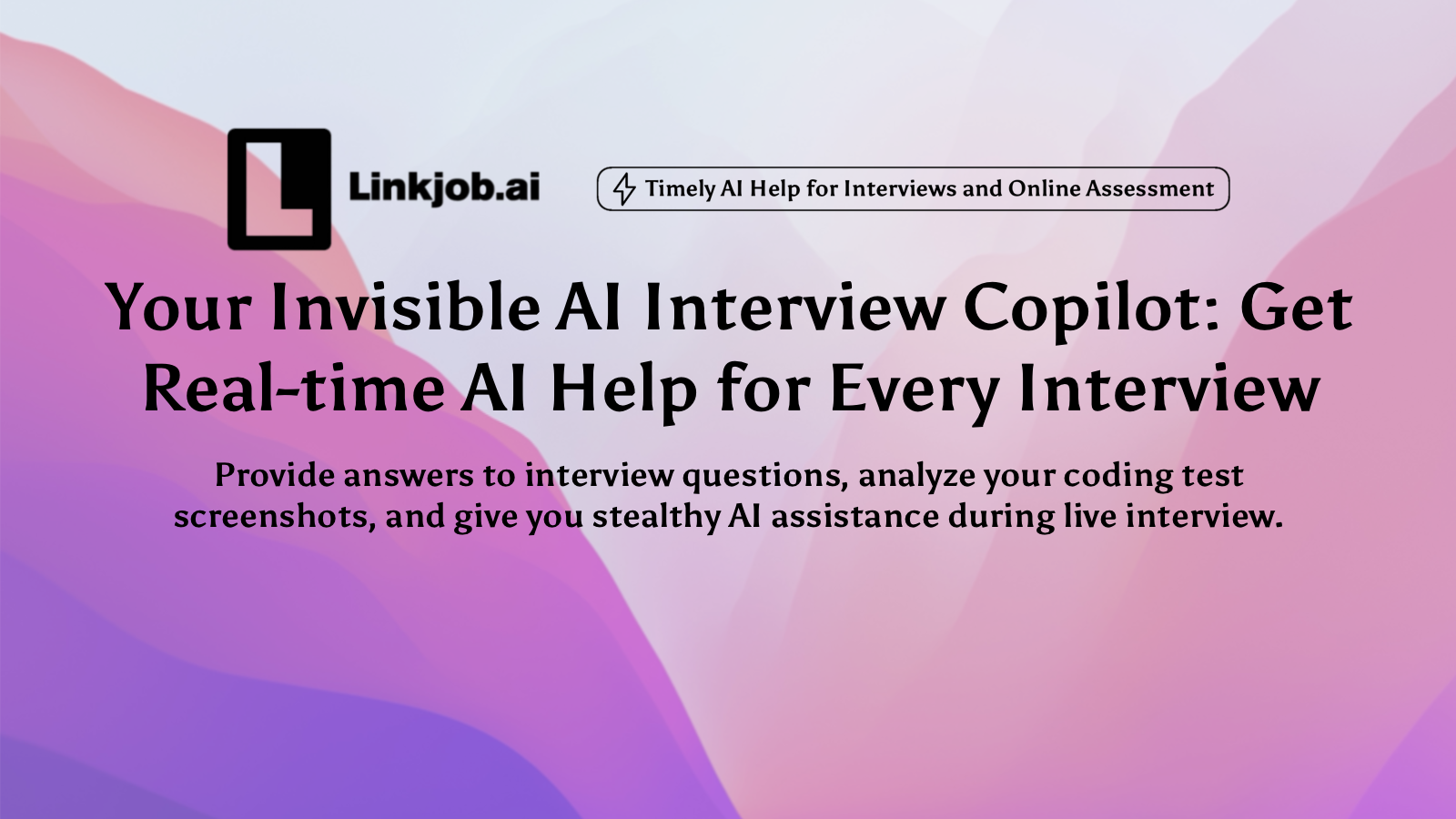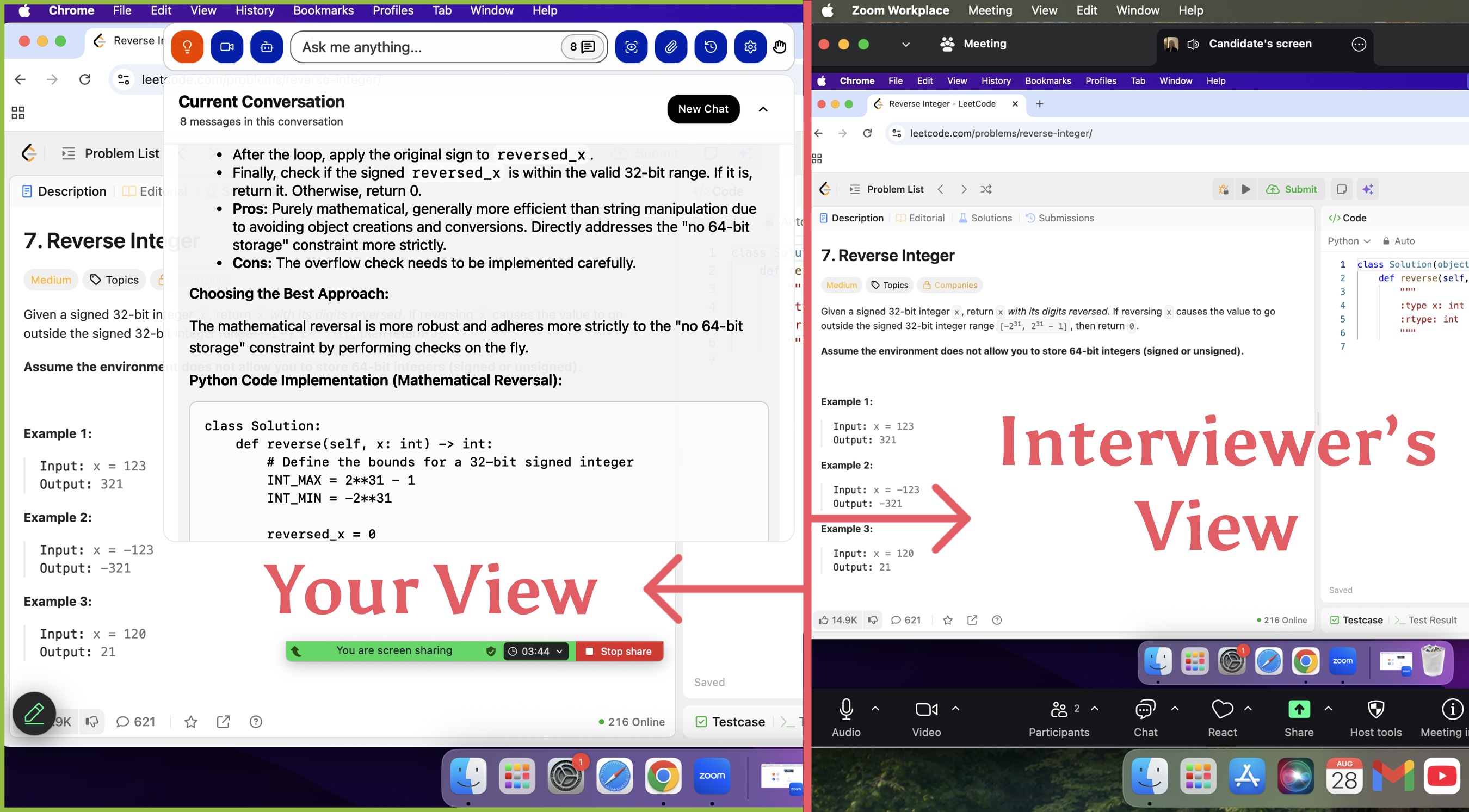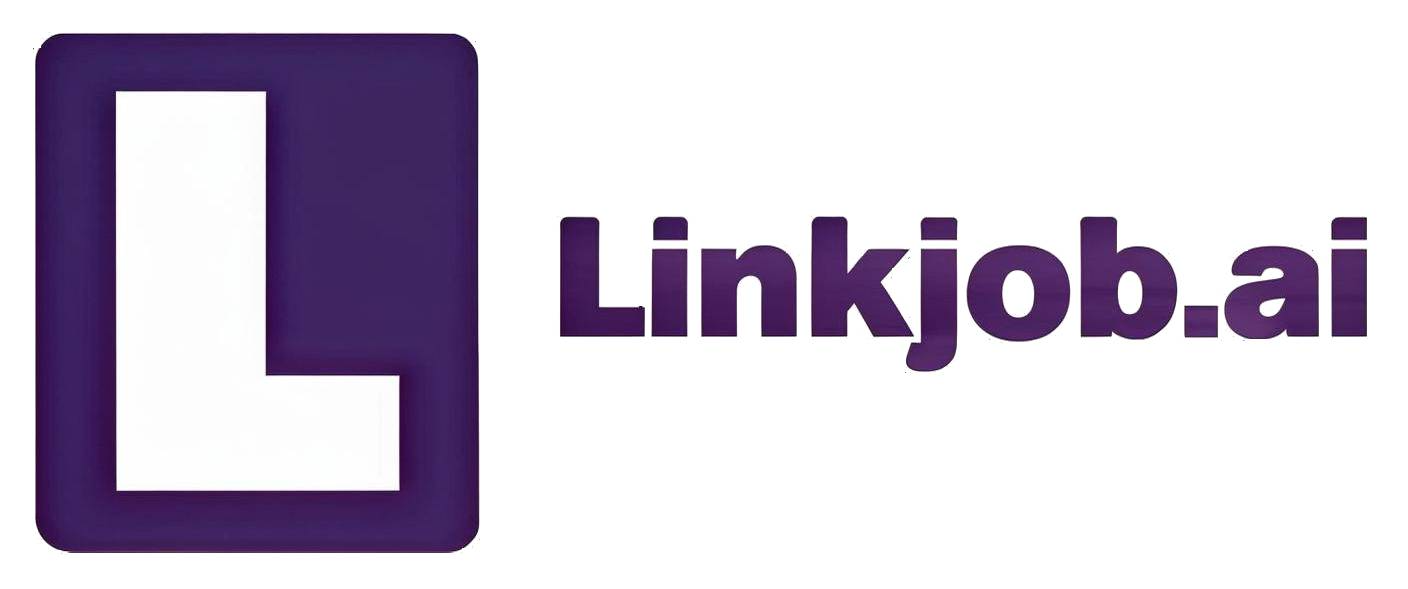How I Answer My Continuous Learning Interview Questions in 2025

In this rapidly evolving world, those who don't keep up are easily left behind. Companies want candidates who can master new skills and stay agile to keep up with trends. This is about adapting to new environments, maintaining motivation, and boosting job performance.
As a result, they are increasingly prioritizing the ability to learn continuously. This is why I wrote this article: to reveal the continuous learning questions I faced in actual interviews, along with my answers and the strategies I used to deal with them.
I am really grateful for the AI interview tool Linkjob.ai, and that's also why I'm sharing my interview experience here. Having an undetectable AI assistant during the interview is indeed very convenient.
What are Continuous Learning interview questions?
Continuous learning interview questions are a fundamental part of modern hiring processes designed to evaluate a candidate's commitment to professional development and intellectual agility. They go beyond simply listing skills and certifications, instead focusing on your internal drive and approach to self-improvement.
In today's dynamic job market, the technologies and best practices of yesterday can quickly become outdated. As a result, companies are looking for individuals who are not only skilled but also self-motivated and adaptable. Continuous learning questions are a critical way for an interviewer to gauge your potential for long-term relevance and success, ensuring you can pivot, adapt, and acquire new skills on your own initiative throughout your career.

Why Interviewers Ask Continuous Learning Interview Questions?
Interviewers ask about continuous learning because they are trying to predict your future performance and long-term value to the company. They are not just interested in the skills you have today, but in your potential for tomorrow.
These questions help them assess several key qualities:
Adaptability: In a world where technology and markets change quickly, interviewers want to see that you can adapt. Your ability to learn new skills shows you can handle change and remain effective over time.
Problem-Solving: The process of learning something new is a form of problem-solving. Your answers reveal how you approach challenges, find resources, and overcome obstacles when you don't have all the answers.
Initiative and Motivation: Interviewers want to hire self-starters. Your answers show whether you are a passive learner who waits for training or a proactive individual who takes the initiative to seek out knowledge on your own.
Passion for Your Craft: A genuine passion for your work often translates into a natural curiosity and a desire to learn more. Your commitment to continuous learning demonstrates your enthusiasm for the industry and your role.
Real Continuous Learning Interview Questions
Now, based on the four key areas of focus above, I'm going to list some continuous learning questions that I encountered in my interviews. I've provided five real questions for each category, so you can see them in more detail. If you want to practice them, you can use a free AI mock interview platform.
Continuous Learning Interview Questions about Adaptability
Describe a time you had to learn a completely new skill for a project. How did you approach the learning process?
Give an example of how you adapted to a major change at work, such as new software, a new team, or a new process.
How would you handle a sudden change in your job responsibilities? Provide an example of a time you’ve adapted to such a change.
Tell me about a time you had to work with ambiguous or unclear instructions. How did you ensure the task was successfully completed?
Have you experienced a major change in technology or industry trends during your career? What did you do to stay relevant?

Continuous Learning Interview Questions about Problem-Solving
Describe a complex problem you encountered. How did you break it down, find information, and ultimately solve it?
Tell me about a recent mistake you made on a project. What did you learn from it, and what steps did you take to prevent it from happening again?
When you hit a roadblock on a project, how do you typically find a solution? Please provide an example.
Describe a time you had to make a decision without having all the necessary information. How did you handle that situation?
Tell me about a time you had to learn from a failed project or experience. What did you learn, and how did you apply that knowledge to your future work?
Continuous Learning Interview Questions about Initiative and Motivation
Describe a time you proactively learned a new skill or knowledge to improve your performance. What motivated you to do so?
Have you ever identified and solved a problem without being asked to by a superior? Please share that experience.
How do you stay informed about the latest trends and best practices in your field? Provide an example.
Tell me about a professional or personal goal you set for yourself. What steps did you take to achieve it?
How do you typically stay motivated when faced with a challenging task? Please provide an example.
Continuous Learning Interview Questions about Passion for Your Craft
Outside of your daily work, what aspects of your field are you most interested in? How do you explore those interests?
What have you recently read or listened to about your industry or profession? What did you learn from it?
Which project in your career has been the most exciting or rewarding for you? Why?
In your opinion, what are the three most important skills or trends for the future of your profession? How are you preparing for them?
What is your long-term vision for your career? How do you plan your continuous learning to support that vision?
Proven Strategy for Continuous Learning Interview Questions
When I face continuous learning interview questions, I always follow a clear, step-by-step method. This helps me stay focused and show interviewers exactly what they want to see. Here’s how I break it down:
Motivation
Interviewers want to know what drives me to keep learning. They look for real reasons, not just generic answers.
I think about what excites me at work or what challenges push me to grow. Sometimes, I get inspired by new technology or feedback from my team. Other times, I want to solve a problem that keeps coming up.
Template:
"I realized I needed to learn more about [topic/skill] when [trigger event]. This motivated me because [reason related to job or personal growth]."
Sample answer:
"I noticed our team struggled with manual data analysis. I wanted to help, so I decided to learn Python to automate our reports."
Example
Next, I give a real example. I talk about a course I took, a project I joined, or a skill I picked up. I make sure the example fits the job I’m applying for.
I avoid vague statements like "I took some online courses." Instead, I describe what I did, how I did it, and why it mattered. I use frameworks like STAR or CAO to organize my story.
Template:
"For example, when I faced [challenge], I decided to [action taken]. I used [resource or method] to learn and apply the new skill."
Sample answer:
"Last year, our finance team needed faster reporting. I took an online Python course and built a script that cut our reporting time by 40%."
Impact
This is where I show the results of my learning. I explain how my new skill made a difference at work. I use numbers or clear outcomes when possible. This proves that my learning had real value.
Interviewers love to hear about measurable results. That's why I always try to include details like time saved, errors reduced, or goals achieved.
Template:
"As a result, [describe the positive outcome]. This helped the team by [specific benefit]."
Sample answer:
"Because of the script I built, our team finished reports two days faster each week. This let us focus on deeper analysis and improved our decision-making."
Resourcefulness
I show how I found ways to learn, and talk about how I identified my knowledge gaps and the creative steps I took to fill them. I want interviewers to see that I don’t give up easily.
Template:
"I realized I needed to improve my skills in [area]. I found [resource or method], and I applied what I learned by [action]."
Sample answer:
"To learn about blockchain, I joined a LinkedIn group, read articles on Finextra, and built a small demo project to test my understanding."
Reflection
Reflection shows that I think deeply about my experiences. I talk about what I learned, how I changed, and what I would do differently next time. I mention any feedback I received and how I used it to improve.
Interviewers listen for honest self-reflection. They want to hear about mistakes, lessons, and growth. I avoid sounding rehearsed. Instead, I share real insights and connect them to the job.
Template:
"Looking back, I learned [lesson]. I realized that [insight], and now I [new approach or mindset]."
Sample answer:
"After building the Python script, I learned the value of automation and teamwork. I now look for ways to automate tasks and share my knowledge with others."
Tips and Pitfalls
Preparation Tips
When I get ready for continuous learning interview questions, I always focus on a few key things. These steps help me feel prepared and confident:
I talk about certifications, training programs, or conferences I have attended. This shows I care about my professional growth.
I stay updated with the latest trends in my industry. I read journals, join professional networks, and follow experts online.
I ask for feedback from colleagues or mentors. Their advice helps me spot areas where I can improve.
I share stories about how I solved tough problems or adapted to new situations. Real examples make my answers stronger.
I research the company and its needs. This helps me tailor my answers to what the interviewer wants.
I explain my approach to learning and give examples of how I keep getting better.
Mistakes to Avoid
I have learned that some mistakes can really hurt my chances in an interview. Here are a few I watch out for:
Giving vague answers or using buzzwords without real examples.
Forgetting to connect my learning to the job I want.
Ignoring feedback or failing to reflect on what I learned.
Sounding rehearsed or robotic instead of genuine.
FAQ
How do I choose the best example for a continuous learning question?
I pick a story that matches the job I want. I look for times when I learned something new and made a real impact. If I can show results, that’s even better.
What if I don’t have a recent learning experience?
I think back to any skill I picked up, even outside of work. Maybe I learned a tool, joined a workshop, or solved a problem in a new way. I focus on growth.
What's the biggest mistake to avoid with these answers?
The biggest mistake is simply listing skills. Instead, tell a story using the STAR method. Describe the Situation or Task, the Action you took to learn, and the positive Result. This shows not just what you learned, but how and why.

